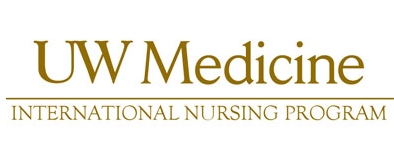What We Do: INP Programs
The International Nursing Program (INP) partners University of Washington Medicine affiliated hospitals, Univeristy of Washington Medical Center (UWMC) and Harborview Medical Center (HMC) nurse preceptors with nurses from low resourced hospitals. The INP has two substantial programs, to facilitate post-graduate nursing education and training.
1. Nurse Preceptor Fellowship: a program for only UW Medicine nurses to incorporate global health as part of their professional practice through abroad visits collaborating with Local Nurse Champions (LNC) in implementing a targeted on the job training and education program in our partnered LMIC Hospitals.
Each INP and LMIC partnership consists of the following steps:
- Form bilateral partnership between UW Medicine and LMIC Hospital
- Conduct initial onsite visit, completing nursing needs assessment and identify local nurse champions (LNC)
- INP and LNC collaboratively develop targeted training program guided by INP training framework and needs assessment results
- One UW Medicine nurse preceptor per month visits onsite for 2-3 weeks to help facilitate the LNC in program implementation and evaluation.
2. Nurse Observership: a program for our Local Nurse Champions (LNCs) to visit UW Medicine for a personalized observational program designed to fit their identified needs. Offering a 4-8 week program that will include exposure to both bedside and administrative nursing, offering access to the UW Medicine's rich variety of nursing resources.
Each nurse observership program will include the following:
- LNC submit application with 250 word abstract describing professional goals to achieve during observership
- Tailored itinerary developed for selected LNC applicant
- Assistance with travel, visa, and homestay accommodations as needed.
- Itinerary will include 8-12 hour shifts observing bedside nurses in their field of interest, appointments with various nursing staff to address specific learning objectives, independent study time conducted in the Health Science Library, conferences, case review, department activities, and nursing ground rounds
- On satisfactory completion, LNC will receive a certificate of completion from UW Medicine-INP
How We Do It: training models
As evidence shows, nurse preceptorship programs are associated with better patient outcomes and improve in-country access to care. Furthermore, train-the-trainer programs are shown to optimize local capacity, enhance sustainability, and demonstrate significant improvements in clinical practice. Using these models we support our Local Nurse Champions (LNCs) in developing and implementing the targeted training programs--creating local ownership and through that, sustainability.
Precepting is a one-on-one teaching model where a more skilled and experienced nurse guides and educates the preceptee in clinical nursing skills at the bedside. The preceptor and preceptee work together as one unit, with the preceptee carefully observing the preceptor in action and then performing tasks under the preceptor’s close observation. A preceptor serves a dual role of practitioner and educator. Their job is to oversee the preceptee's clinical nursing tasks is crucial in helping the preceptee in linking nursing theory to application in a clinical setting. The Precepting model leverages existing skills of preceptors and empowers them to become role models, leaders, evaluators, socialization agents and protectors to the apprentice nurses.
Train the Trainer (TTT) is an education model where by individuals identified to teach or train others attend training themselves resulting in a method where a more experienced provider facilitates programs to a less experienced practitioner. This module lends itself to disseminate knowledge or training more efficiently. The benefit to TTT methodology is it’s increased success with permanent transfer of skills and sustainability of performance improvement. It also enhances integration because it transfers teaching responsibilities to locally trained staff that understand their own hospitals culture, communication, and modes of operation. It embeds skills into practices and empowers local providers. It leads to a transformation in the learner from a passive receptor of information to a collaborator in the education and training process.
Our Impact
Measurable Outcomes not Outputs: We will test statistically and clinically meaningful changes. We expect improvements in three metrics:
- local nurse's skills
- inpatient mortality rates
- nurse job satisfaction and retention
These three metrics will permit comprehensive evaluation of the effectiveness of the INP program.
Each nurse trained cares for 1000s of potential patients giving this program significant impact in saving lives.

